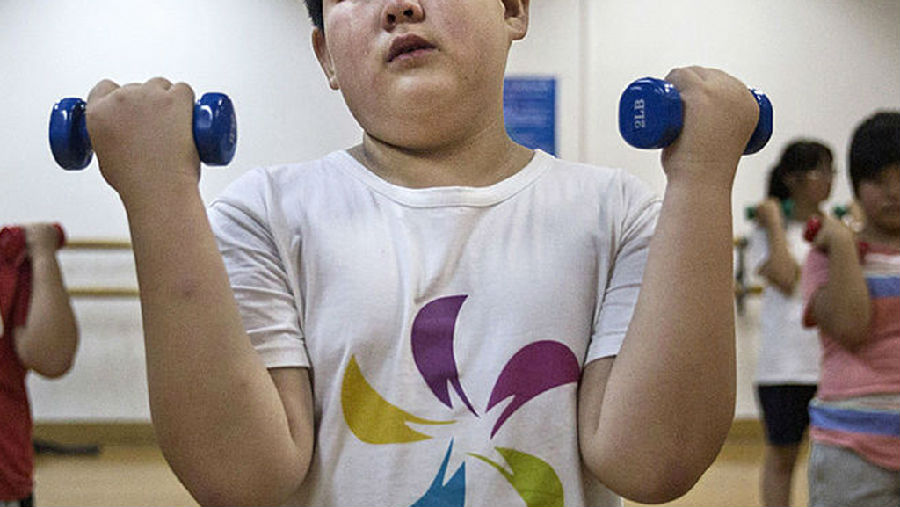(单词翻译:单击)
Exposing their bellies to a television audience while their weight is displayed on screen, obese contestants on a hit Chinese reality show compete to slim the fastest, with a midriff-baring weigh-in a weekly highlight.
在一个中国热门真人秀一周最精彩的露脐称重环节中,肥胖的参赛者们向电视观众露出他们的肚子,他们的体重也展示在屏幕上,他们相互竞争谁是最快变苗条的人。
Thirty per cent of Chinese adults — roughly 320m people — are overweight and about 12 per cent obese, China’s health watchdog said last week, creating an eager audience for Jiangsu Television’s Changing My Life.
中国健康监督机构最近表示,中国有30%的成年人——约3.2亿人——超重,约12%的成年人肥胖,这给江苏卫视的《减出我人生》节目带来了一批热切的观众。
As China escaped from decades of poverty, obesity was connected with higher incomes. But there is mounting evidence that, as has occurred in western countries, the link with affluence is breaking, with lower-income urban residents more prone to the problem.
随着中国从数十年的贫困中逃脱,肥胖一度与收入的增加有关。但正如西方国家的情况,越来越多的证据表明肥胖与富裕的链接正在断开——低收入城市居民更容易出现肥胖问题。
Using education levels as a proxy for socioeconomic status, Chinese and Australian researchers have found that while the better-educated in China’s less-educated areas are more likely to be overweight, the reverse relationship holds in areas with a better-educated population, which tend to be urban.
中国和澳大利亚的研究人员将受教育程度作为衡量社会经济地位的指标,他们发现,在中国受教育程度较低地区的受教育程度较高人群更有可能超重,然而在人口受教育程度较高的地区,受教育程度较低的人群反而更有可能超重,后者往往是在城市地区。
“Received wisdom that obesity is a ‘disease of the affluent’ in China is simply not good enough,” the researchers write in a paper to be published this month in the medical journal Health and Place. Data for the study was obtained from some 98,000 adults in 2010.
“有关肥胖是‘富贵病’的普遍观点在中国并不能很好地说明情况。”研究者们在本月即将发表在医学期刊《健康与地域》(Health and Place)上的一篇论文中写道。该研究所用的数据收集于2010年,来自9.8万名成年人。
Changing My Life’s 10 contestants, chosen from urban areas, are put through a military-style fitness regime while hosts scrutinise their snack-filled diets and probe their family histories for emotional traumas in an attempt to figure out the root cause of their overeating. Every week the one who has lost the least weight is eliminated in an often tearful public ordeal.
《减出我人生》的10名参赛者是从城市地区选出的,他们将接受军事化管理的健身计划,与此同时,主持人们将仔细观察他们充满各种小食的食谱,从他们的家庭过往探索参赛者们的情感创伤,试图找到他们暴饮暴食的根本原因。每周,减重最少的人会在一场往往催泪的公开严酷考验下,失去比赛资格。
The majority of the the contenders are far from wealthy. The champion of the show’s first series, broadcast last year, was low-paid prison guard Zhan Changguan, who shed 66 kilograms over the course of the series. His main rival Gao Chilin was a school dropout from the central city of Wuhan, who lost 61kg.
大多数参赛者都绝非富有。去年播出的该真人秀第一季的冠军是收入不高的狱警詹昌荣,他在节目期间减重66公斤。他的主要竞争对手高池麟是来自中部城市武汉的辍学者,他在节目期间减重61公斤。
Chinese newspapers have picked up on the changes in distribution of obesity.
中国的报纸已经注意到肥胖分布情况的变化。
“The rich becoming thin while the poor become fat should not be a trend,” the state-run China Youth Daily declared in November. It called for more public sports facilities rather than the fee-paying gyms that the increasingly health-conscious urban middle classes are joining at unprecedented rates, while working-class urban residents say they have little time to exercise.
“富人瘦穷人胖不应是一个趋势,”官媒《中国青年报》旗下中青在线在去年11月的文章中宣称。该文呼吁建立更多公共运动设施,而不是需要付费的健身房。越来越多有健康意识的城市中产阶层正在以前所未有的速度投入到健身房健身之中,而工薪阶层城市居民则表示他们几乎没有多少时间锻炼。

China’s growing weight problem — the country in 2014 overtook the US to boast the world’s largest obese population, while the average waistline expanded by 2.7cm among men and 2.1cm among women in the decade up to 2012 — has fuelled an explosion in obesity-related diseases such as diabetes.
中国日益加剧的体重问题促使糖尿病等与肥胖相关的疾病出现爆炸性增长。在2014年,中国就已经取代美国成为世界上肥胖人口最多的国家,在截至2012年的10年中,中国男性的平均腰围增长了2.7厘米,女性则增长2.1厘米。
The ruling Communist party vowed last year to boost the number of people “frequently participating in physical exercise”, targeting an increase to 530m by 2030 from 360m in 2014. The research suggests investments in facilities for lower-income urban residents will be crucial.
执政的中国共产党去年誓言要提高“经常参加体育锻炼”的人数,目标是在2030年时将人数从2014年的3.6亿人提高到5.3亿人。研究表示,投资适合低收入城市居民的体育设施将是关键。


